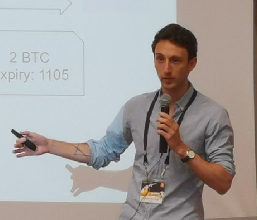3 Questions on Quantum Computing (Dr. Elham Kashefi)
- Justin Mailfait
- Jan 22, 2020
- 3 min read
3 Questions To… Dr. Elham Kashefi, Professor of Quantum Computing at the School of Informatics University of Edinburgh, Research Director at the French CNRS (French National Science Research Center) in LIP6 Sorbonne University. Elham co-founded the Quantum Protocol Zoo, an open repository of protocols for quantum networks, as well as VeriQloud Ltd. a company specialised in software architecture design and app development using quantum networks.

French congresswoman Paula Forteza just presented her report on quantum technology to the government on January 9th 2020. In this document, there are no less than 37 strategic proposals seeking to propel France as a leader on quantum computing and quantum technology in general. In this context, Coup Data wanted to know the insightful opinion of a field professional.
1.
The discovery of quantum physics during the XXth century rocked the scientific world, and led to major inventions such as the transistor or the GPS. How would you describe the current breakthrough in quantum studies and the consequences attached to the use of quantum computers, or quantum cryptography?
We are witnessing the second quantum revolution (as coined by Alain Aspect), every aspect of information processing and communication (Security, Privacy, Computational Speed, Precision, Cost, etc.) will be quantumly enhanced.
« We are witnessing the second quantum revolution (as coined by Alan Aspect) »
It is not just a matter of better machines that are emerging, we are embracing a radically different way of manipulating data enabling us to probe new territories from simulation of complex many-body system to discover exotic materials all the way to informationally secure communication for unhackable, verifiable, private cloud computing.
2.
French congresswoman, Paula Forteza states that quantum technology is a “technological turning point” that France cannot miss. What is your take on France’s chances to become a European, or even a world leader on this matter?
France has it all: skills, knowledge, person-power, accumulated over decades of French leadership in the academic domain; as well as large scale industries and growing number of smaller startups committed to transfer quantum knowledge to quantum innovation; and most importantly France is well integrated within the European quantum ecosystem for a global influence. So now all we need is a quantum government to connect the puzzle pieces in a coherent national program as proposed in the quantum technology report.
3.
Calculation capacities offered by large scale quantum calculators are potentially endless, but there are yet to be invented. Which short term opportunities and challenges do you see revolving around quantum technology? Can you tell us more about VeriQloud on this matter?
I fully agree on the term, yet to be invented, we are here for a long marathon not a short sprint for both hardware and application design (as emphasised by Christopher Monro). However Noisy Intermediate-Scale Quantum technology (coined by John Preskil) i.e. order of 100s of not very perfect quantum bits, that are becoming available in the next few years are already promising a suite of applications in quantum simulations (e.g. quantum material and quantum chemistry) and in quantum computing (e.g. machine learning and quantum optimisation).
« we are here for a long marathon not a short sprint for both hardware and application design »
In quantum communication, we already have commercially available quantum key distribution and random number generator with Intermediate-Scale quantum networks already running in China, Japan, UK, Europe and elsewhere. In the short term, VeriQloud’s work aims to strengthen networks using quantum ressources. We are developing a hybrid classical-quantum cloud with better security and efficiency using today’s quantum technology.
But VeriQloud’s full stack approach is also ready for the next generation of quantum networks as targeted in project such as Quantum Internet Alliance. This will enable new quantum applications, which are collected in the Quantum Protocol Zoo to give a full picture of future evolutions of quantum networks.
TO GO FURTHER:
Rapport Quantique - January 9 2020, remise du rapport « Quantique, le virage technologique que la France ne ratera pas »
Note sur les cryptographies quantiques et post-quantiques par Cédric Villani - July 2019, « Technologies quantiques : cryptographies quantiques et post-quantiques » (n°18 - juillet 2019)
LIP6 Homepage - About LIP6, the computer science laboratory of Sorbonne University's Faculty of Science and Engineering
Elham Kashefi - About Dr. Elham Kashefi



Σχόλια